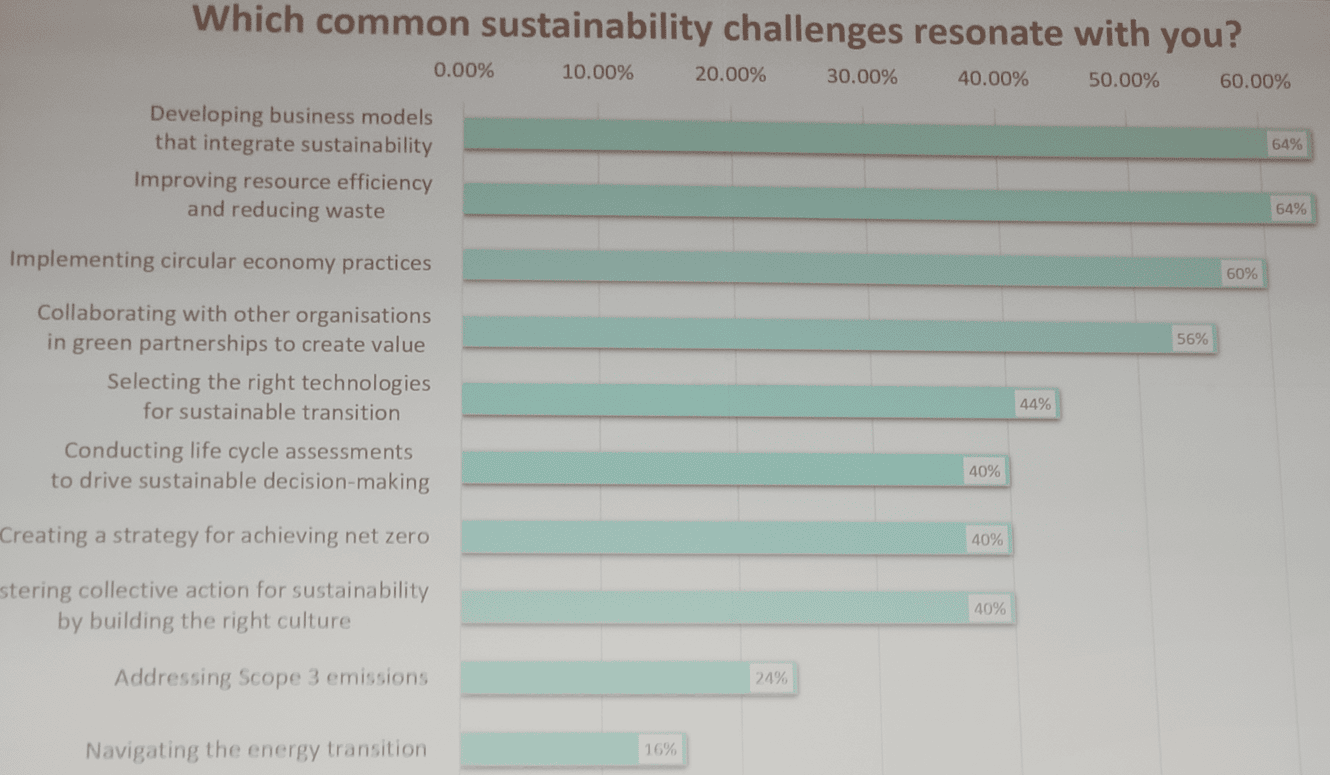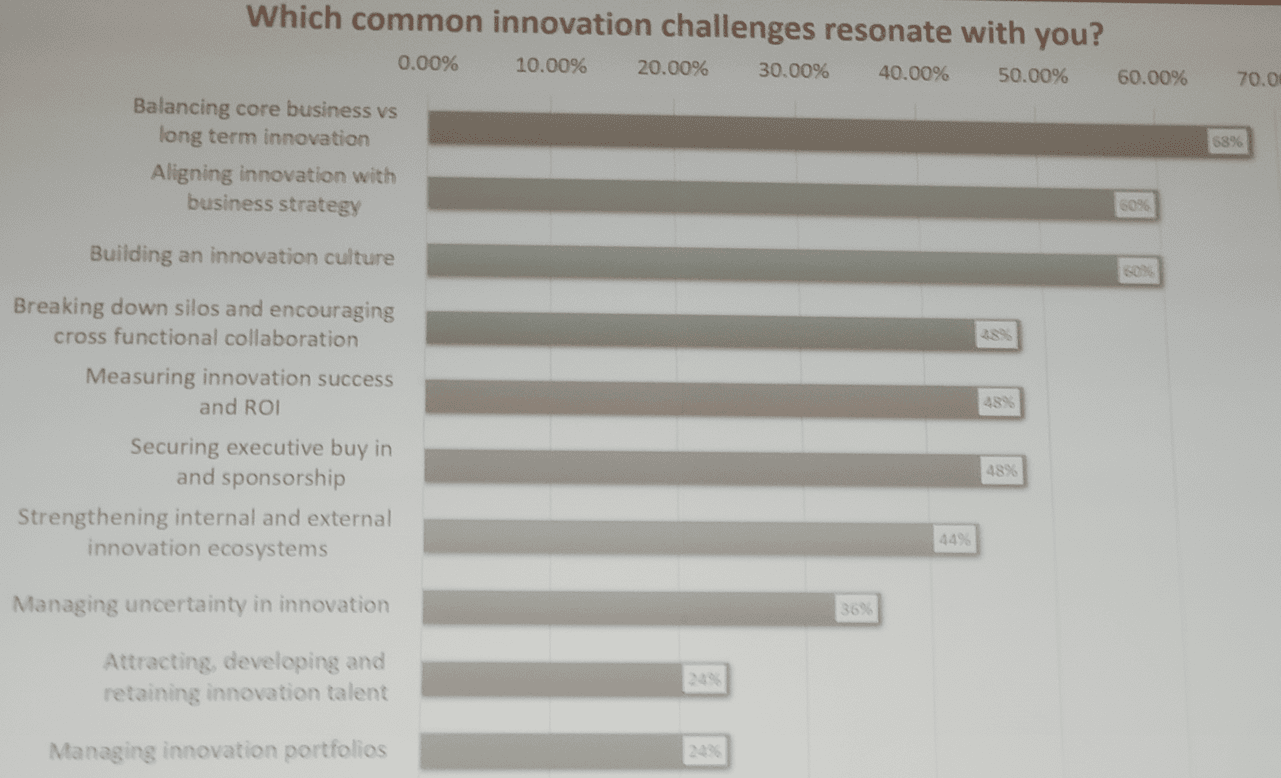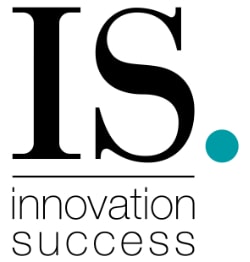I attended the Institute for Manufacturing’s Rethinking Innovation Conference on a sunlit spring day in Cambridge – and I have to say, it was an enlightening experience. The serene, walled enclave provided a temporary respite from all the chaos that seems to be happening in the world right now.
These events not only provide an opportunity for new learning and reflection, they also help me adapt my offerings to meet the challenges that technology-led companies are struggling with right now.
Here’s a summary of what I learnt from the Conference:
TOP 3 SUSTAINABILITY CHALLENGES
The Pre-conference poll gave us an insight into the delegates ‘ sustainability concerns,
- Developing business models that integrate sustainability (64%)
- Improving resource efficiency and reducing waste
- Implementing circular economy practices (60%)
Sustainability as an existential crisis
Tim Minshall, head of the Institute for Manufacturing and professor of innovation management, opened on confronting the innovation imperative. Tim’s message on sustainability as an existential crisis was particularly striking. He emphasised that failure in innovation is inherently uncomfortable but necessary for growth. In other words, failing, while necessary, just doesn’t feel very good.
His call for innovation champions resonated deeply, highlighting the need for leaders to navigate and inspire transformative change.
We know about the examples of British Sugar’s circular refinery and my own experience of Orica’s automated mining trucks illustrating successful “breakthrough” transformations. British Sugar’s approach to creating a circular refinery demonstrates the potential of integrating sustainability into core operations. Orica’s collaboration with mining firms to develop automated trucks showcases the power of technological innovation in enhancing efficiency and safety.
Sustainability is no longer optional
Steve Evans took to the stage with what I saw as a “boiling rage”—a visceral, urgent energy that drove home his belief that sustainability is no longer optional or siloed; it’s now embedded in all our jobs. His delivery cut through with clarity and passion, urging us to rethink not just how we act, but how we measure success altogether. He challenged the orthodoxy that GDP is the right measure of progress, suggesting instead that our collective obsession with growth might be misleading us.
“Net zero is not an either-or thing,” he said, “nor is it one-dimensional.” His critique went beyond the environmental imperative, it was a call to reframe the very structures through which we view value, future-readiness, and innovation itself.
One of his standout messages: efficiency is our superpower. If we’re serious about sustainability, we must combine efficiency, value, future, and technology in cohesive, strategic ways. And just as importantly, we must stop doing stupid stuff; habits and systems that are no longer serving us in a resource-constrained world.
Waste as an Asset
Julie (General Manager at Toyota UK) highlighted Waste as an Asset. She shared insights into the Burnaston refurbishment and customisation line, positioning it as a strategic sustainability initiative. She stressed that Diversity, Equity, and Inclusion (DEI) are not mere niceties but essential components of modern business success. Drawing from Toyota’s heritage in the Toyota Production System, she illustrated how viewing waste as an asset can drive sustainable practices.
Addressing the Raw Material Challenge
Diana and Pamela of E.ON: Addressing the Raw Material Challenge, highlighting the criticality of raw materials, particularly in light of the impending surge of waste from first-generation photovoltaic cells reaching their 25-year end-of-life. They introduced the IfM’s new Innovation Velocity tool, designed to visualise emerging technologies and facilitate strategic planning. Their discussion underscored the necessity of incorporating circular economy principles throughout the technology lifecycle, starting from the design phase.
The Irreversible Momentum towards Net Zero
Guy (Chanel): The Irreversible Momentum Towards Net Zero observed that companies are universally embarking on net-zero programmes, noting the unstoppable momentum towards sustainability and it being a reassuring trend for the future.

TOP 3 INNOVATION-RELATED CONCERNS
- Balancing core business vs long term innovation (68%)
- Aligning innovation with business strategy (60%)
- Building an Innovation Culture (60%)
The Power of Open Innovation
Letizia and Amy (Biffa): The Power of Open Innovation discussed the evolution of open innovation since its popularisation in 2003. They articulated how open innovation enhances resilience, boosts innovative productivity, elevates brand reputation, and accelerates the sustainability transition. Their insights reinforced the value of collaborative approaches in addressing complex challenges. Quoting Fatih Birol,
“In a world of great uncertainty, collaboration is essential to achieve our shared vision for net zero.”
Transformation can feel abstract
Nigel from Britvic reminded us that while transformation can feel abstract, it starts with something incredibly tangible: talking about it every day. If we want sustainability and innovation to take root, we need to embed them in daily conversations, across leadership, operations, supply chains, and even customers. As he framed it, achieving momentum in these areas requires constant effort to “gain share of voice.” It’s a communication strategy that becomes a cultural one.
Digital Twins
Tom from Raynor Foods delivered a fresh perspective with his walkthrough of their smart factory. While many in the industry are rushing to talk about “digital twins,” Tom called out the fact that much of what is billed as a digital twin is actually just industrial digitalisation done well. His point: Language matters. If we use emerging tech terms loosely or incorrectly, we risk setting false expectations and ultimately misunderstanding where true value lies. His showcase reminded us that true transformation isn’t in the buzzwords—it’s in the operational depth.
Breakthrough innovation at scale
Then came Elliott from Google X, who offered an insider’s view on how to run breakthrough innovation at scale without losing your soul – or your budget. He acknowledged a common dilemma: we often don’t have the tools to convince ourselves to invest in long-term, uncertain innovations. But with advances in AI modelling, we’re beginning to fill that gap, giving innovation leaders better ways to simulate outcomes and de-risk bolder bets.
Elliott reaffirmed the critical need to separate radical innovation from the core business, a principle still central to Google X’s operating model. Without this separation, disruptive ideas either get diluted or stifled. And even more critically, he warned of a cultural trap: if an organisation doesn’t genuinely cultivate a risk-mature culture, all it creates is innovation theatre performative gestures rather than real change.

My reflections as a Roundtable Host
The conference underscored the imperative of collective efforts in navigating the path to sustainability. Serving as a roundtable host provided a unique vantage point to engage with diverse perspectives. The discussions highlight the multifaceted challenges and opportunities in innovation and sustainability. A recurring theme for me was the necessity of integrating sustainability into the core business strategy rather than treating it as an add-on. The concept of viewing waste as an asset, as highlighted by Julie from Toyota, resonated across discussions, prompting reflections on how this mindset can be universally applied.
Unexplored Avenues and Recommendations
While the conference covered substantial ground, certain areas need further exploration:
- Metrics for Innovation Success: Establishing clear, standardised metrics to evaluate the effectiveness of innovation initiatives, particularly in sustainability, remains a challenge.
- Cross-Sector Collaborations: Encouraging partnerships between traditionally unrelated industries could unlock novel solutions and drive systemic change.
- Policy Advocacy: Engaging with policymakers to create conducive environments for sustainable innovation is crucial.
- Digital Transformation: Leveraging digital technologies to enhance sustainability efforts presents untapped potential.
Conclusion
The IfM’s Rethinking Innovation Conference served as a catalyst for deep reflection and dialogue on the intersection of innovation and sustainability. The insights shared by speakers and participants alike underscored the urgency of integrating sustainable practices into the fabric of organisational strategies. As we navigate an era of unprecedented change, the collective wisdom and collaborative spirit exhibited at the conference offer a hopeful path forward.
Can we create a better strategic roadmap to our destination?

